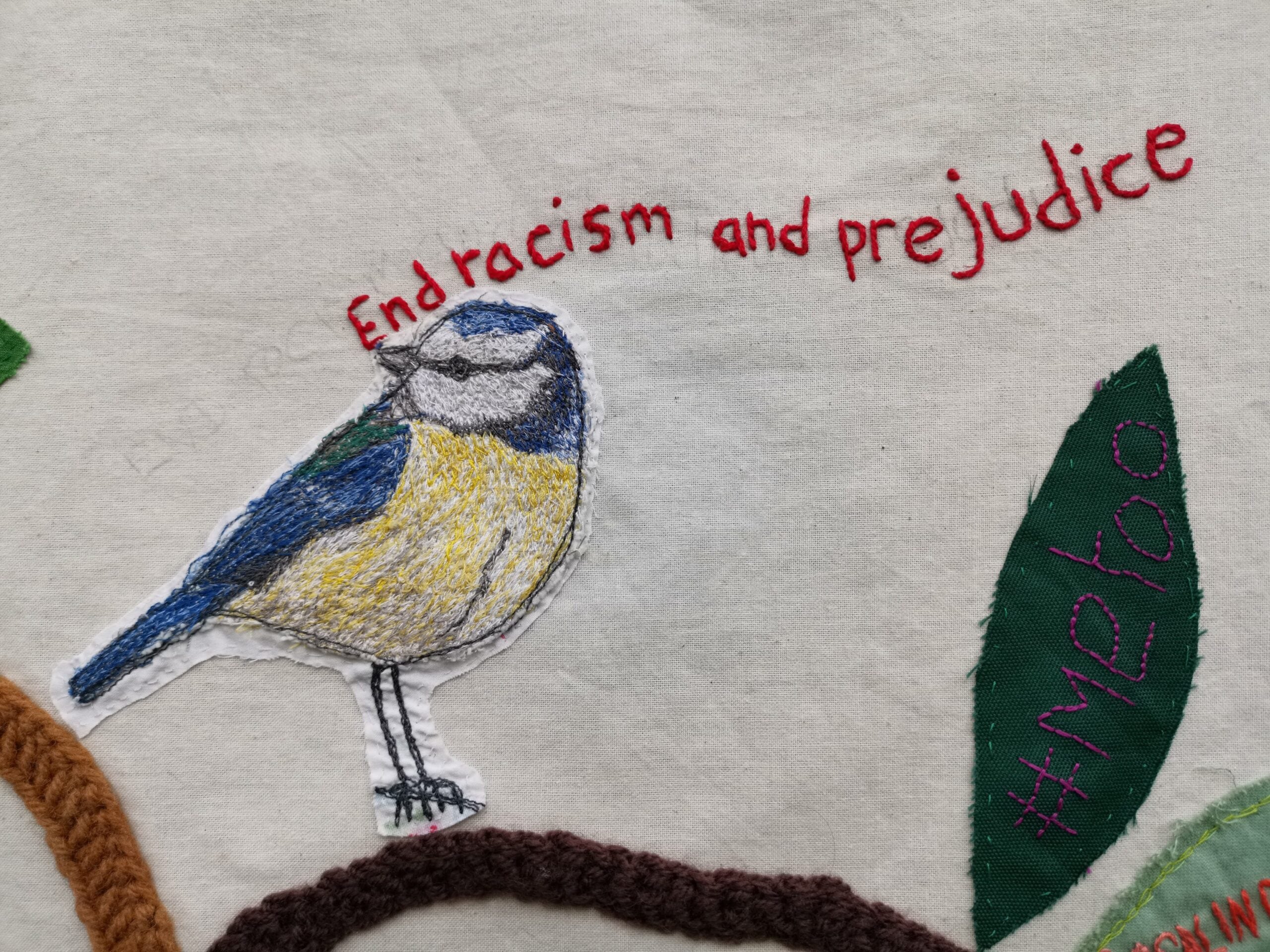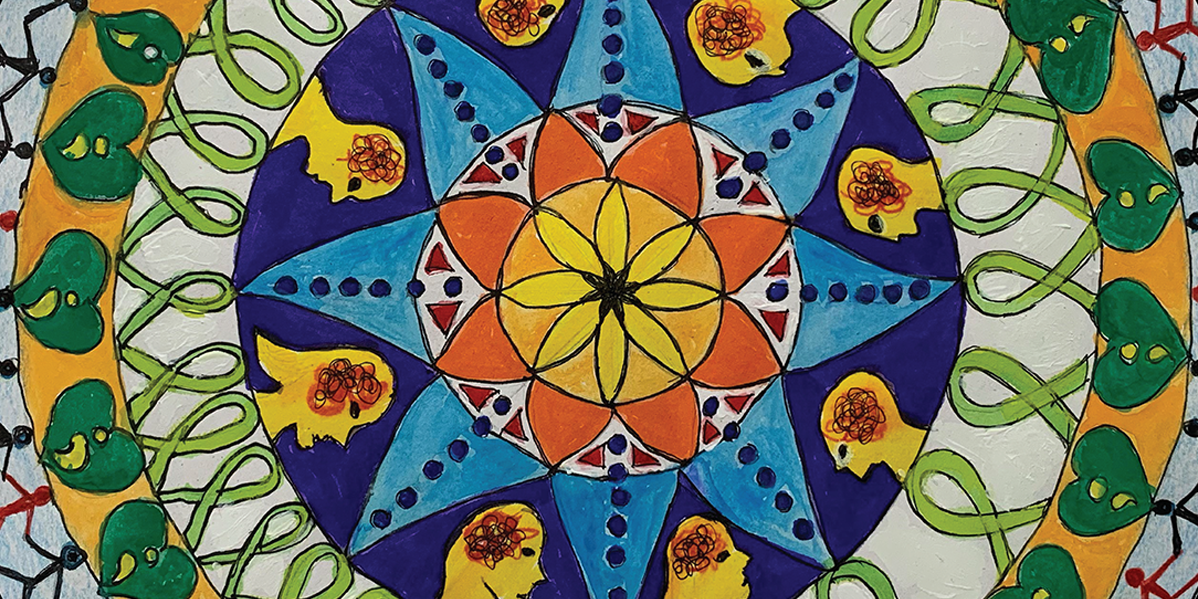WE LOCKED DOWN BEFORE THE LOCKDOWN
A workshop led by Safely Held.
Monday 19 April 7:00 PM – 8:30 PM BST

From ‘Tree Banner: Strength in Numbers’ made by Sew Angry, a response to the celebrations in 2018 of 100 years since some women got the vote
Before the lockdown, many of us were already isolated. Dealing with our own distress or that of our loved ones, our power was weakened. We have since found ways to come together to rediscover social power. At the conference, we will be exploring how to ensure healthier outcomes for all.
Our interactive arts workshop offers another way in. We invite people to participate in exercises of thought association and communal drawing to allow reflection and discussion about mental health in the context of COVID lockdowns. What are the highs and lows of our collective and individual experiences and the kinds of change we would like to see?
We will safely hold a facilitated space by being present and confidential, listening carefully without judging, seeking understanding, then to be understood. Participation in exercises is voluntary.
The workshop complements the Safely Held short films exhibition and the virtual Safely Held exhibition of work at www.safelyheld.org. This includes ‘Collaborative Tag’, an artistic dialogue across media, which allows for COVID-safe creative support links to develop between ourselves, other survivors and carers, and those who are cared for. People created work in response to each other, reflecting the needs and responses of the participants.
The workshop exercises will be led by Cathy Dunbar, Jill Eastland and Jane Hellings.
WHO WE ARE
This workshop is led by Safely Held, a Cambridge-based collective of survivors and carers/supporters using our long experience of arts activism and community dialogue to share and develop understanding – re-imagining support for mental distress, through talking, learning and healing.
We and our loved ones and allies have received some helpful – and some harmful – support from mental health professionals and we encourage bottom-up building of resources for people in mental distress, their carers and supporters. We bring that perspective to our work in hospital and community services with both service users and professionals, using arts to build confidence and competence in the ways we communicate.
Before and during COVID, we have also used our art and dialogue practices to support grassroots community organisations and campaigns around Cambridge, including a woman’s hostel, carer groups and other mutual aid gatherings to combat racism and discrimination and defend green space.
As activists with lived experience of mental health issues, we recognise the critical effect on health of felt powerlessness and inequality. We are developing fresh practice in solidarity with those in crisis and their supporters, alongside conversations with healthcare staff, also under extreme pressure. We understand that distress is best relieved by joining together with others to develop shared power.
WHERE WE CAME FROM
Two of us, near neighbours knowing each other from our children’s schooldays, were supporting each other and our families in crisis. We began to search for more acceptable and effective healing opportunities for ourselves and our loved ones. We found the most helpful were either led by those with lived experience – such as the Hearing Voices Network and The Icarus Project – or invited a focus on lived experience, such as Open Dialogue. We encountered Karen Taylor at a Compassionate Mental Health meeting in London who introduced discussions about safe spaces and safer healing. We invited people we knew from related activities to a meeting in Cambridge to consider these different approaches. Funds for this were provided by Rethink and Disabled People Against the Cuts (DPAC).
After this, one of us with a long history of performance practice focused on empowering the patient voice, joined a Sew Angry workshop, led by another member of our group. We experienced safe conversations with a creative focus in solidarity (with the local working class suffragettes and activists of old, celebrated on the banner we sewed), enabling people to confront difficulties, often for the first time.
We began talking about meeting to reflect on our practice, as carers and survivors. We all had arts or dialogue practices, such as art for activism and therapeutic support; communication work with health staff and patients; support for service/voluntary carer groups and hospital inpatients; and advocacy for Travellers experiencing discrimination in maternity services. We hoped that our getting together would support each other as peers, develop our practice and provide opportunities for others, including our secluded loved ones.
We applied for the free use of the Judith E. Wilson Drama Studio, at Cambridge University Department of English, to run open research and development workshops. This proved a much needed place, away from home, to think together. When the Social Power and Mental Health conference was initially going to be a live event, we planned to run a safe space with some art and dialogue activities as part of the CRASSH conference next door.
After lockdown we joined in many online meetings exploring “madness” and “recovery”, led by people with lived experience, accessing the knowledge and encouragement needed for our own healing and support roles, more easily than had been possible from the fund-starved state provision. We received funds from the National Survivor User Network COVID-19 fund, allowing us to meet effectively online with groups and individuals. From two we grew to eight core people, with an expanding number of arts practitioners, survivors and carers who have continued to meet together and collaborate with others, live and online, ever since.
Note: Pieces illustrating or inspired by actions with local groups form part of the Social Power and Mental Health online exhibition. These include:
Corona House https://www.chsgroup.org.uk/supported-housing/womens-services/corona-house/
Movement Against Racism https://www.facebook.com/MovementAgainstRacism
Friends of St Matthews Piece https://www.facebook.com/FriendsofStmatthewspiece
Traveller Advocacy https://oblique-arts.com/projects/gtr
and Sew Angry https://capturingcambridge.org/herstory/sewangry
See the online Safely Held exhibition at www.safelyheld.org.
Safely Held: Talking, Learning, Healing is supported by the National Survivor User Network COVID-19 fund www.nsun.org.uk.
